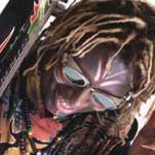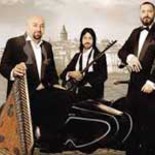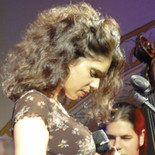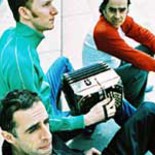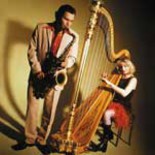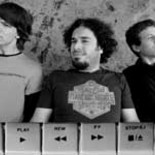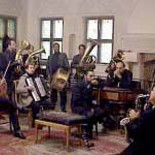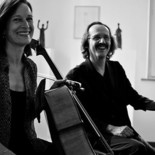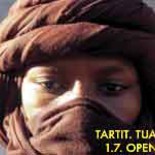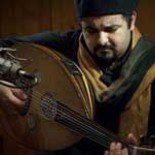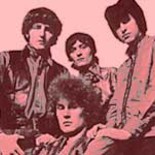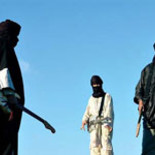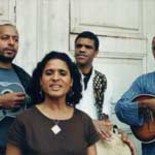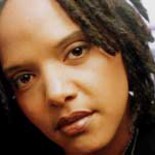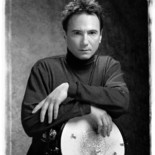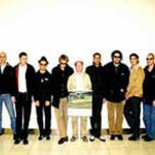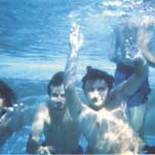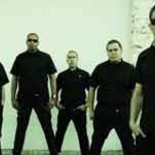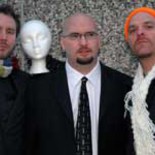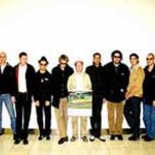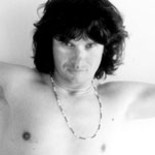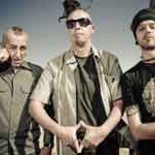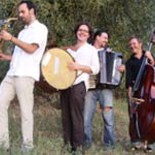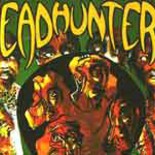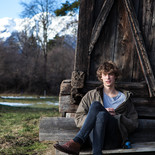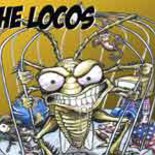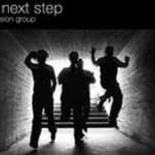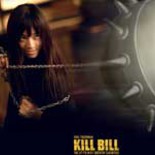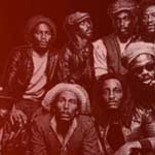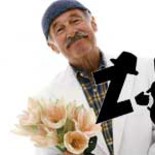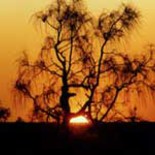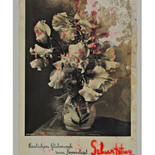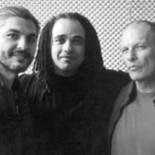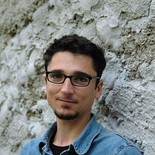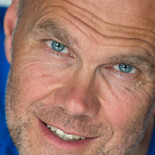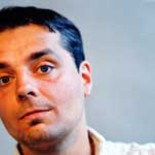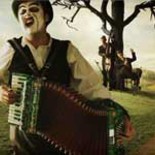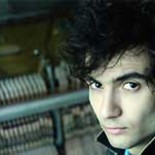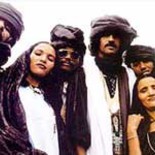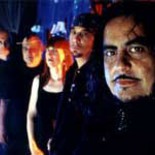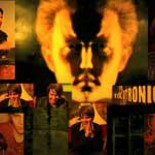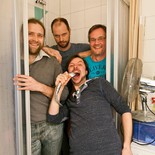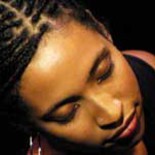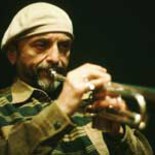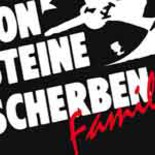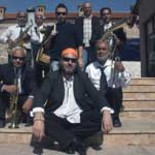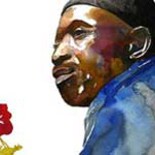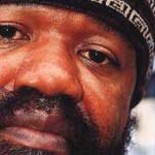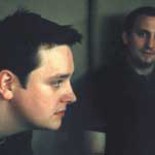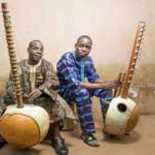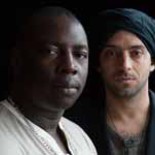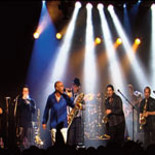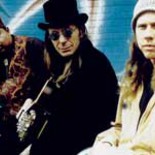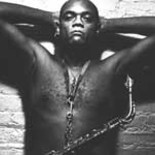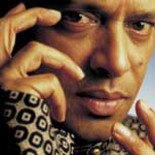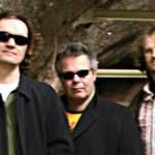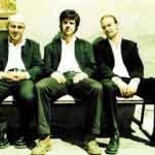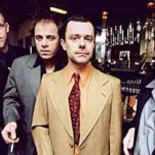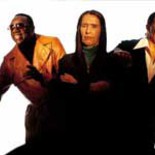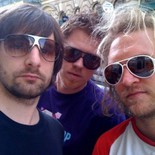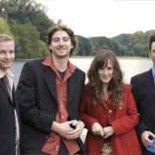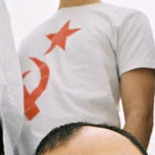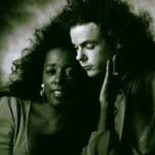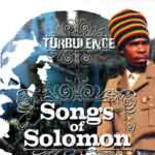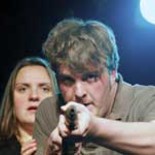Idan Raichel p,
Vieux Farka Touré g
Yogev Glusman b
Souleymane Kane calabash
Ein erstes Austesten der gemeinsamen Bühnenenergie 2010 im spanischen Cartagena wurde zum magischen Event. Schnell beschlossen der Sahelmann und der Israeli deshalb, ihre gute Chemie in ein Album umzumünzen. Ergebnis: eine der bezwingendsten Akustiksessions der letzten Jahre. Die spontane Intensität der Scheibe The Tel Aviv Session, die im September 2012 erschienen ist, hat aus dem Stand Vergleiche mit Talking Timbuktu eingebracht, dem legendären Werk von Tourés Vater und Ry Cooder. Im intimen Setting eines Wohnzimmerstudios spinnt das Touré-Raichel Collective in elf Stücken ein relaxtes und cooles Repertoire aus einem Traumland zwischen ruppiger Sahel-Pentatonik und nahöstlicher Melodiefülle.
In ausgewählten Konzerten wird nun diese stimmige Intimität fortgesponnen und verfeinert, denn aus der natürlichen Spontaneität der Livesituation wurde dieses Gipfeltreffen ja schließlich geboren. Das Publikum darf Zeuge werden, wie sich Vieux Farka Touré mit kunstvoll verzwirbelten Soli auf seiner Akustikgitarre mit Raichels still perlenden Kaskaden auf dem Piano abwechselt. Wie sich knackendes Kalebassenhandwerk zu andächtigen Hintergrundchören fügt, aber auch wie die Dialoge von Touré und Raichel mit preschender Rhythmik befeuert werden. Dieses entspannte Gipfeltreffen zwischen einem Muslim und einem Juden ist ein fulminanter Einblick in die hohe Kunst intimen Konzertierens, beschwört zugleich Bilder von einer sich wiegenden Karawane und der anmutigen Ruhe eines mediterranen Hains herauf.
*****
The Idan Raichel Project (Music from the Middle Eastern Folk/Roots - Israel)
This artist has achieved great success by looking beyond intercultural differences and celebrating the value of diversity, changing the face of Israeli popular music and offering a message of love and tolerance that resonated strongly in a region of the world where headlines are too often dominated by conflict.
Idan Raichel performs in his band with first class musicians with different musical backgrounds giving a very soulful world experience to the audiences. Idan Raichel is a superstar and gains also internationally big respect around the globe. For example: How many musicians count the privilege of performing once in their lifes in front of the US President Obama? …Well, Idan Raichel is only in his mid-thirties and has done it already twice! And Last December 2010 Idan Raichel was chosen together with India Arie to perform live at the Peace Nobel Price Ceremony – an event followed all around the globe by millions of people and for sure one of the biggest honors for any artist. With an enchanting blend of African, Latin American, Caribbean and Middle Eastern sounds, they have already taken Israel by storm selling more than 200.000 CDs! This unique project has collected worldwide very good critics for their albums but as well as for their live shows which they have presented in legendary venues as i.e. the Opera House Sidney, Kodak Theater Los Angeles, Queen Elizabeth Hall London, Teatro degli Arcimboldi Milano, Wiener Konzerthaus, EXPOZaragoza, Estival Jazz Lugano, Piazza del Campidoglio, etc
Vieux Farka Touré (African music – Mali)
Vieux Farka Touré (born 1981), known as "the Hendrix of the Sahara", is a singer and guitarist born in Niafunke, Mali. He is the son of legendary African blues musician Ali Farka Toure. Vieux has proven through his engaging live shows staged all over the world that he is the heir to Ali's talent while still distinguishing himself from his famous bluesman father by transcending the limitations of the world music genre. International acclaim is still pouring in from his second full-length release in May 2009 by Six Degrees Records, Fondo—one of iTunes best World Music albums of 2009, and a staple on critics' year-end pick lists as chosen by the Wall Street Journal, The New York Times, The Village Voice and the BBC among many others.
In June 2010 the Vieux Farka Touré (VFT) Live album was released, affirming that Vieux has become a legend in his own right, emerging at a crucial point in history, just as the Western world is finally beginning to take notice of West African acts like Amadou & Miriam and Oumou Sangaré. Not only does the VFT Live album capture the excitement of Vieux's much-anticipated 2010 FIFA World Cup performance in front of a billion audience over the world, but it also confirms that tens of thousands of music fans all around the world already know that Vieux's live show is championship-caliber.
Vieux Farka Toure's third studio album, The Secret (Six Degrees Records), will be released on May 24, 2011. The album produced by guitarist Eric Krasno (of Soulive fame) also features Dave Matthews, Derek Trucks, John Scofield, Ivan Neville and Vieux's final collaboration with his father, Ali Farka Touré.
The Story Behind The Touré-Raichel Collective
Israeli superstar Idan Raichel and Malian guitar virtuoso Vieux Farka Touré first met at an airport in Germany in 2008 while both were on tour. From this chance encounter an artistic kinship was born, culminating in an unscripted recording session that took place one afternoon in November 2010 in a small Tel Aviv studio. Joined by Israeli bassist Yossi Fine and Malian calabash player Souleymane Kane, Idan and Vieux improvised a masterful selection of songs that capture the unbridled creativity and inspired collaboration of these four brilliant musicians. The Touré-Raichel Collective was formed and the songs they recorded are the foundation of the album The Tel Aviv Session. Idan Raichel is a massive pop star and household name in Israel. With his distinctive long dreadlocks and turban, Idan is immediately recognized wherever he goes. The music he creates with his internationally renowned band The Idan Raichel Project unites African, Middle Eastern, Eastern European and other multicultural flavors into an accessible global pop amalgam.
Idan has long been a fan of the legendary Ali Farka Touré, Vieux’s father and main musical inspiration. “I listened to Ali Farka Touré for years,” says Idan, “I even used his sound as the muse for one of the songs on my first album.” Upon meeting Vieux, Idan was effusive in his praise. “I have a dream,” Idan told Vieux, “I will leave my band and come join yours as a keyboard player. I don’t care if I get paid or anything, I just want to follow you around and see how you do it.” As one of Africa’s premier guitarists and a member of Malian musical royalty, Vieux is probably accustomed to the fawning of fans, but Idan proved his sincerity when he hopped on a flight to Cartagena, Spain to join Vieux in concert. “Going back to being a side musician and taking that opportunity to learn from Vieux was a magical experience for me,” Idan recalls. “It was like the owner of a restaurant who goes back to waiting tables just for the experience!” Vieux recalls, “When I first met Idan he looked like a crazy hippie to me. But he carried himself with a lot of confidence. He was cool and relaxed. I knew there must be something powerful about this guy. Then the minute we first played together, I knew that I was right. He has deep talent and a deep soul.” Two years later, Idan became the curator of a world music series at the Tel Aviv Opera House, and he invited Vieux to perform the first concert. It was a magical night, with Vieux and Idan trading riffs backed by Vieux’s full band. Also joining them on stage that evening was bassist Yossi Fine, who shares a close relationship with both Vieux and Idan. The leader of Ex-Centric Sound System, Yossi is an exceptionally gifted bassist who has recorded with everyone from Lou Reed to Meshell Ndegeocello. Yossi had produced Vieux’s second album Fondo, and he also happened to have been one of Idan’s musical mentors. When the unforgettable concert was over, Idan wanted more. “You know what, lets find a studio and jam," he proposed, and the next day they met at a friend's studio in south Tel Aviv. Idan, Vieux, Yossi and Souleymane from Vieux’s band played for just three hours. The music flowed out effortlessly, with minimal discourse and maximum improvisation. Its hard to imagine that the songs they created that day were made up on the spot, and it’s a testament to their high level of musicianship and deep communication. “It was like the closing of a circle,” recalls Idan. “ I had known Yossi since I was a young musician just learning the ropes, and he had worked so closely with Vieux as well. Little did I know that my meeting with Vieux at that airport in Germany would eventually lead to such a special musical experience.” The studio was set up like a living room. Yossi sat next to Vieux on a couch and they all took breaks to have coffee and hang out. They recorded straight from the heart, just playing whatever came to them. Sometimes they taught each other some lines, a melody, other times they just played. Vieux and Idan rarely find themselves playing in such an unadorned, acoustic manner. Vieux’s regular sound is more electric with a hard driving rock groove. Idan’s virtuosity as a pianist is often shrouded in the lush, flashy arrangements of the Idan Raichel Project. The session gave each of them a chance to reveal the depth of their skill and talent. “This album represents a new step for me,” points out Vieux, “It's the first time I have done a full album collaboration and it's the first time I have really exhibited my acoustic playing on an album. So, for me, it demonstrates a maturing of my music and my career.” For Idan, working in this way allowed him to explore the full capacities of his instrument. “The way that I play piano during the session comes from the kora,” points out Idan. “Sometimes I'm using the strings of the piano, plucking them with my fingers like a harp, other times I’m beating the piano as if it were a drum. I use the piano as a whole instrument.” Vieux’s manager, Eric Herman of Modiba, was in the studio and remembers, “I was thinking to myself, ‘Alright, this is fun, a really nice little jam.’ Soon there were two or three tracks and I started to think ‘Hmm, maybe there will be something here we could use.’ After about five or six more amazing songs were laid down I said, ‘Wait a minute, we have a full album here!” “Because there was no expectations,” Eric explains, “it was really the most fluid and pleasant recording experience. They all just played until they got tired. As it was unfolding, it was pretty clear to everyone something special was happening and that's why it kept going and going and by the time it was done I knew that we had a really good
record. What struck me was the nakedness of it. So many people agonize over all the aspects of a recording; everything is premeditated in virtually all recording sessions that I've been to. And this was entirely freeform -- an open exchange.” When Idan started playing rough mixes of the session to others and witnessed their astonished reactions he knew that they had captured something unique. Idan began to edit the tracks, trimming some sections and fleshing out others. “There were some people that we wish had been there that day, so we decided to ask them to record some additional parts.”
They invited singer Cabra Casey, an Israeli of Ethiopian heritage who is a member of the Idan Raichel Project, to write lyrics in the Ethiopian language Tigrit and sing on the song “Ane Nahatka”. Another member of the Idan Raichel Project, Yankele Segal, played the long-necked Persian tar on “Kfar”. Mark Eliyahu, who immigrated to Israel from the Russian republic of Dagestan, added the haunting sound of the kamanche, an Azerbaijani fiddle, to “Alem”. While touring and recording with American singer India.Arie, Idan had met French harmonica virtuoso Frédéric Yonnet, who added a rousing harmonica part to the bluesy groove of “Touré”. Meanwhile Vieux recorded vocals for the song “Alkataou” and asked his friend the bass player Patrick Ruffino to sit in as well. The result is The Tel Aviv Session, an album that merits inclusion in the pantheon of exceptional displays of virtuoso improvisation typified by classic albums such as Talking Timbuktu by Ali Farka Touré with Ry Cooder, Keith Jarrett’s The Köln Concert or Vincent Segal and Ballake Sissoko’s acclaimed Chamber Music. That Idan is a Jewish Israeli and Vieux a Muslim African matters not at all to the musicians themselves, but it does symbolize the fact that artistic creation always manages to uncover the deep connections between people rather then the things that make them different. “Vieux and I share the same DNA,” asserts Idan, “We are both deeply linked to the places where we come from, our family and spiritual roots. These are the things that really matter.” “Music has no borders,” declares Vieux, “What’s important is the spirit between people - their backgrounds are not a factor at all if there is a shared respect and a musical connection. From the first time I played with Idan, we shared this musical understanding. So to me it doesn’t make a difference if he is from Israel, Japan, or Mars, we will speak the same language when it comes to music.” That sense of connection and respect comes through loud and clear on The Tel Aviv Session.
